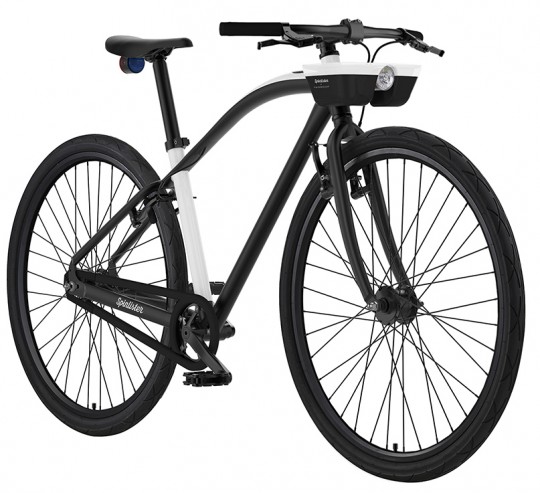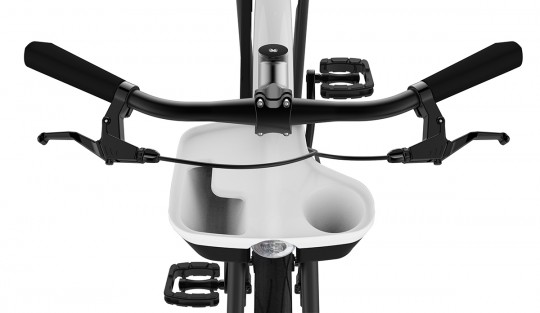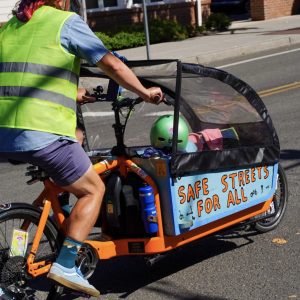Back in 2011, when she cast the lone vote against Portland’s still-unimplemented public bike sharing system, Commissioner Amanda Fritz asked a fair question: If bike sharing is such a good idea, why doesn’t the private sector do it?
It’s taken a little while. But with what looks to be a well-funded launch in Portland this summer, the company Spinlister is trying a novel idea for doing exactly that with their Smart Bike model.
Here’s the twist: every bike in the system would be independently owned by individual Portlanders, who would also pocket the revenues.
The company announced today that starting in “late summer,” Portlanders will be able to order black and white Spinlister-branded shared bicycles equipped with Bluetooth-activated chain locks … for free … and then roll them directly into service on the street.

Then, somewhat like car2go vehicles, the bikes will be parkable anywhere. If you want to use one, you’ll pull up Spinlister’s app, find its parking spot, unlock it and ride away.
Half the revenue from each rental, Spinlister says, will go to each bike’s owner, with the other half going to Spinlister until the bike’s up-front cost is paid off.
Spinlister Chief Marketing Officer Andrew Batey wrote in an email Friday that once each bike is paid off — he predicts they’ll cost between $650 and $900 — the rental rate will revert to Spinlister’s usual share for peer-to-peer bike rentals: 82.5 percent for the owner and 17.5 percent for Spinlister.
As for repairs and maintenance such as tire pumping, Batey said Spinlister is identifying “official bike shop partners” to maintain the bikes.
“In the initial roll out, Spinlister will roll any maintenance needed into the financing,” he added. “However, we’ve intentionally made these bikes to be durable. … Ultimately, I think there will be some minor stuff bike owners will naturally do, but as they’re making money off the bike it’s in their own interest to stay involved as well. The end goal is to get a fleet of these out there, payed off through financing, that collectively create a sustainable bike share model by people, for people.”
As with Spinlister’s existing model, which helps people rent out unused bikes from their garage for cash, people who pay to borrow Spinlister bicycles will waive any claim of liability against Spinlister or the bike’s owner.
“However, in the event something happens, we carry a million dollar liability policy already,” Batey added.
Advertisement
“This new decentralized bike-share model will take the traditional system of a central hub or station, and turn it on its head,” Batey writes in the company’s press release. “From a renter’s perspective, they can simply use the Spinlister app to locate a bike, book it, unlock it and ride away.”
Here are the specs of the branded Vanmoof bikes the company will be selling. They’ll include 28-inch fat racing tires and two gearing options: Sturmey Archer 2-speed kickback shifting or an 8-speed Alfine hub. Batey described them as “high quality bikes that even a hardcore bike enthusiast will enjoy.”
The company will be sharing more details at a 7 p.m. media event this evening at the SXSW festival in Austin. If you want to be among the first to own a floating Spinlister-branded bike, you can sign up here.
“It’s a high quality smart bike that people actually WANT to ride. Simply put, the Spinlister system is better because it’s efficient, self-sustaining, and requires little investment from outside sources.”
— Spinlister CMO Andrew Batey
We’ve written on BikePortland about Spinlister’s existing peer-to-peer rental service several times over the last few years — most recently in January, we wrote about Spinlister’s surprise success here in Portland.
“It baffles me that we have so many bikes here in Portland — with no push from us whatsoever,” Batey told us then. “We didn’t really embrace Portland, Portland embraced us.”
Portlanders have listed about 200 of their own bikes on the service, with average daily rental rates of $20.
Batey and his colleagues are pitching their product with some swagger as an alternative to what they describe as a “broken” model of public bike sharing.
“Our bike share model requires no sponsorship, government assistance, or tax funds to maintain,” Batey writes. “It’s a high quality smart bike that people actually WANT to ride. Simply put, the Spinlister system is better because it’s efficient, self-sustaining, and requires little investment from outside sources.”
This is certainly a fascinating business model, and it’s interesting that it’s probably being launched in Portland because it won’t be competing with public-sector bike sharing. At least not yet.
Update 2:10 pm: I’ve updated this post with much more information about the deal and how it’ll work.








Thanks for reading.
BikePortland has served this community with independent community journalism since 2005. We rely on subscriptions from readers like you to survive. Your financial support is vital in keeping this valuable resource alive and well.
Please subscribe today to strengthen and expand our work.
the future is now! this is what bike share has always wanted to be and could be, just needed the pieces to fit together.
I think the future will wait until all these share app’s are developed open-source so vulture capitalists can’t make bank providing public services.
It’s a really cool approach to bike sharing and potentially a game changer versus the costs of a centralized approach. But it seriously underestimates Portland’s bike theft problem. In a city where bike corrals themselves are being sawn through, I’m not sure of the defense that a “hardened steel chain lock” will provide (especially to those just scavenging components).
While we don’t know for sure at this point, one might assume “On-board computer and integrated electronics” would include some sort of tracking system? After all, how else would a potential renter know where the bikes are located?
According to Batey, the bikes will communicate by sending a Bluetooth or radio frequency signal to the app of the user who checks them in and out. I think it’s actually the same technology behind this bike counting toolwe covered recently. Further detail:
“It has GSM, Bluetooth and RF tracking. But for media I like to keep it to: wireless anti-theft tracking. The way we will use it: When bike is stolen a customer can activate the tracking by email. We will find location and tell customer through email where his bike is located. He can use the app to track the last meters using Bluetooth or RF. We will keep updating location to customer till bike is found. Service is provided by VANMOOF.
“For regularly updating the location rental to rental, we use bluetooth. Your phone only allows you to “unlock” or “end rental” when you’re within range (within 10 to 25 feet). Therefore, once you end rental we send the location through your phone to update into the system. It’s not a perfect location marker, but it will get you within a couple feet – easy to find.”
I guess that thing hanging off of the front is a cup holder, but it looks a little like a bedpan. Here in Portland, I don’t want to own any more bikes with rim brakes. I certainly don’t want to maintain them for the public.
Huh? Rim brakes are much easier to maintain than disc brakes. If you have problems braking in the rain, try brakes with a different rubber compound.
Disagree. Disk brakes are a snap in many ways compared to rim brakes. (Cable-actuated ones, anyway; don’t know about hydros ’cause I’ve never had ’em.)
They should use roller brakes / drum brakes or coaster brakes instead. That’s what professional bike share systems use.
This private sector model is much better.
Clever and interesting model! Some issues I’m curious about (as a not-disinterested observer; we’re tacking some similar issues with our Open Bike Initiative project):
* I assume they’re offloading location tracking to the phone app? That is, a user reports where they left a bike, and the system assumes it stays where it was last officially left. On-board GPS/location reporting for each bike has some challenges (technical, regulatory and cost-wise — e.g. each bike needs a wireless service plan). Offloading to the phone is a good way to sidestep these challenges, but potentially undermines the goal of always knowing where the bikes truly are.
* It will be fascinating to see how they address load balancing and maintenance — e.g. am I responsible for “my” bike, even if it ends up far away? Decentralized, organic load balancing can work surprisingly well in some circumstances, but in others — such as with particular topography — bikes tend to go one way and never come back. And if each owner is responsible for maintenance of their particular bike, presumably the bikes end up unevenly maintained, and possibly dangerous in worst-case scenarios. A more centralized load balancing and maintenance process changes the paradigm a bit, though — it’s almost like bike owners would be franchisees or investors (perhaps a great model, but fairly complex).
In any case, super cool boundary-pushing. I think we’re heading into an era of significant bike share innovation.
Hey Brad, great to hear your take. See my reply to Kyle above for a little more information.
I’d still prefer a city-owned bike share program, but this looks promising.
Now that I’m thinking about it more, I’m certain that these bikes would end up stolen or with parts missing; if the intention is to have them locked up all day and night with just a chain lock.
The risk allocation issue here is interesting. If “my” bike gets damaged or stolen, do I bear the full loss? Or does the rider who last had it? Spinlister? My insurance company? Some insurance regime provided by Spinlister? Some combo of the above?
Alta and B-Cycle uses proprietary parts to help reduce this risk. I agree that it is a bigger problem with these bikes, which like they use look off-the-shelf parts that could be more easily resold.
awesome!
Hmmm… the video shows disk brakes and a 7 or 8 speed rear hub, but the photos show single speed bikes with rim brakes. I wonder if the dynamo is enough to power the lights AND recharge any onboard electronics. Perhaps there are no active electronics on board, only in the lock?
The bike in the pictures is a later model than the one in the video, I’m told.
*looks at all the bikes in the room*
Is there a reason that is has brakes set opposite what nearly every other bike has?
So was the opening paragraph meant to be a cheap shot at Amanda Fritz? If so, good job; golf clap. It’s time for her to go!
Awaiting Mia’s comment.
If this is going to succeed as a form of regular public (I mean private) transportation, many many bikes will be needed. A couple hundred won’t do. They’d have to roll out with 1,000+ bikes early on. Also, to my knowledge, all of the public bikeshare systems that have succeeded included redistribution systems in which trucks distribute the bikes to different parts of the city throughout the day. Lacking a redistribution system, a huge chunk of the bikes will end up downtown by 9am and will stay there until 5pm.
I’m a fan of Spinlister’s current model where I own some bikes and can choose to rent them out, but I’ve only ever had one request. I can’t imagine that many people are going to buy a new odd bike at $900, and expect to make ~60 days booked in a time period that will earn them money before the bike goes missing. I certainly wouldn’t pay up front if I had any risk, given that the locking system is rather poor.
If renting bikes in this way does take off, won’t more people buy them, and the chance to break even continually gets farther away? And if it doesn’t succeed, you are left with a mediocre bike that will have little resale value? I just can’t envision how this model would work positively, but maybe I’m missing part of the deal. Regardless, I’m very interested to watch what happens! I think Spinlister has huge potential with their current system, which perhaps just needs a big influx of advertising to get popular.
It looks like people who participate in renting out and maintaining the bikes won’t have to pay anything upfront:
“Portlanders will be able to order black and white Spinlister-branded shared bicycles equipped with Bluetooth-activated chain locks … for free … and then roll them directly into service on the street.”
Spinlister’s current model is more for renting out bikes for days at a time. This new model of bikes locked up all over the place would be more for quick trips, similar to the car2go model. I think theft or lack of theft will make or break this system. If theft isn’t a problem and people can make a profit, the system will succeed. I still say Spinlister needs to launch with 1,000+ bikes, however. Not sure how they would achieve that.
Not awesome. This will be a disaster.
This might be interesting, but it’s NO replacement for a publicly-supported, full-infrastructure bike share program. Seattle (along with so many other cities) has put Portland to shame on this, and is also rapidly expanding its buffered bike lane network. And where are we? It is embarrassing for Portland that all city officials can say about when bike-share will arrive, if ever, is…. nothing.